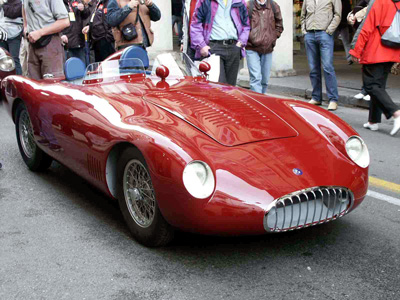May 19th, 2004
When OSCA Met Porsche
by Pete Vack
Photos Copyright Alessandro Gerelli
Our man in Italy, Alessandro Gerelli, has again covered
the Mille Miglia. He returned with hundred of photos. We decided
to start with OSCA, for this event hailed the fifty year
anniversary of the meeting of OSCA and Porsche.
In addition to Alessandro's photos, we are fortunate to have
obtained permission from LMG Auto and the widow of Carlo Demand,
to publish the image of the Hans Hermann Porsche Spyder as
the occupants ducked under a rail crossing. The drawing was
first published in "The Big Race", in 1956. More of Carlo's
work can be seen, and ordered, from
www.lmgauto.com.

|
 Carlo Demand's work depicts some of the greatest moments in racing history, such
as Hans Hermann remarkable 1954 Mille Miglia.
Carlo Demand's work depicts some of the greatest moments in racing history, such
as Hans Hermann remarkable 1954 Mille Miglia.
|
In the Fifties, sportscar racing was more national than international. Cooper and Lotus raced primarily in the British Isles (and the US). VP Renaults and Deutsch Bonnets tended to stay in France, and Porsche and Borgwards rarely left the Fatherland. Oscas and Stanguellinis, then fierce competitors, fought long and hard battles in the many road races and hillclimbs in Italy. But four, maybe five, times a year at the major FIA events such as Le Mans, the Mille Miglia, and Nurburgring, the cars of all nations gathered together to compete for overall and class victories.

|
 The editor apologizes for not being able to identify all of the OSCAs pictured
herein. In 1954, Giulio Cabianca piloted an OSCA similar to this one. But despite a new 1500cc engine, he failed to beat Hermann's Porsche.
The editor apologizes for not being able to identify all of the OSCAs pictured
herein. In 1954, Giulio Cabianca piloted an OSCA similar to this one. But despite a new 1500cc engine, he failed to beat Hermann's Porsche.
|
In 1954 after successes in both the 1100 and 1500 cc classes in Italy and the US, OSCA had virtually no peers. But in May of 1954 � fifty years ago this month � the factory Porsche team entered the Italian dominated Mille Miglia, ready to do battle with the remarkable four cam Porsche 550 Spyder. OSCA was about to meet Porsche.
OSCA came to the event with the latest MT4 1500 for the experienced and fast Cabianca. On paper, the two cars looked equal, each with about 110 hp, and each weighing in at 1300 lbs dry. But on the road, the speed and handling of the Porsche was astonishing, and the Spyder, driven by a young and hungry Hans Hermann, proved too much for even Cabianca.

|
 Fittingly, the Porsche 550 Spyders were also on hand at this year's Mille Miglia. But today, the results are irrelevant.
Fittingly, the Porsche 550 Spyders were also on hand at this year's Mille Miglia. But today, the results are irrelevant.
|
In order to beat the Italians at their own game, Hermann drove the race of his life. Approaching a blind railway crossing at 160 kph, he was amazed to find the crossing bars down! Realizing that late braking was out of the question, Hermann and his co-driver both ducked, and the low slung Spyder just made it under the downed crossing bars. Later Hermann recalled that "something flashed over our head � and we were through, only a couple of millimeters in front of the train!"

|
 The MT4 1100 of Barthelemy and Barthelemy.
The MT4 1100 of Barthelemy and Barthelemy.
|
Cabianca finished an honorable second, but still ten minutes behind the twenty five year old German. The defeat stung. Ernesto Maserati went to work on a new desmodromic valve design, and introduced the TN (Tipo Nuovo) MT4 as an interim solution. At Le Mans a month later, OSCA brought two 1500s, but Porsche entered four 550s, and despite running on only three cylinders at the end, a Porsche won the class.

|
 This MT4 1100 was built in 1953 and driven at the event by Pickering and Earl.
This MT4 1100 was built in 1953 and driven at the event by Pickering and Earl.
|
The Macklin'Leygonie OSCA, leading the disabled Porsche, was disqualified for having obtained assistance after an off-course excursion. But it would have been a hollow victory. On four cylinders, the Porsches were clocked at over 137 mph on the Mulsanne straight, versus the OSCAs 125.46 mph. The days of the MT4 were numbered. The desmo OSCA never quite worked out, while Porsche went from strength to strength. And back in England, the firepump Coventry Climax SOHC was being installed in Colin Chapman's very advanced Lotus Mk 11.
Things would never be the same.

|
 A very rare 2000S, one of three built in 1954. Entered in the Mille Miglia
by Reiss and Sgorbati.
A very rare 2000S, one of three built in 1954. Entered in the Mille Miglia
by Reiss and Sgorbati.
|

|
 No single individual was ever credited with the classic OSCA design. At first
the bodies were built in the OSCA factory, then later jobbed out to Fratelli
Morelli.
No single individual was ever credited with the classic OSCA design. At first
the bodies were built in the OSCA factory, then later jobbed out to Fratelli
Morelli.
|

|
 This one is easy to identify, despite having no race numbers. It is serial
number 1169,the famous Whale Tail. Or is it 1163, as driven by Sgorbati
in the 1955 Mille Miglia? How about that, race fans!
This one is easy to identify, despite having no race numbers. It is serial
number 1169,the famous Whale Tail. Or is it 1163, as driven by Sgorbati
in the 1955 Mille Miglia? How about that, race fans!
|

|
 Just two lovely OSCAs on the way to the market....
Just two lovely OSCAs on the way to the market....
|



